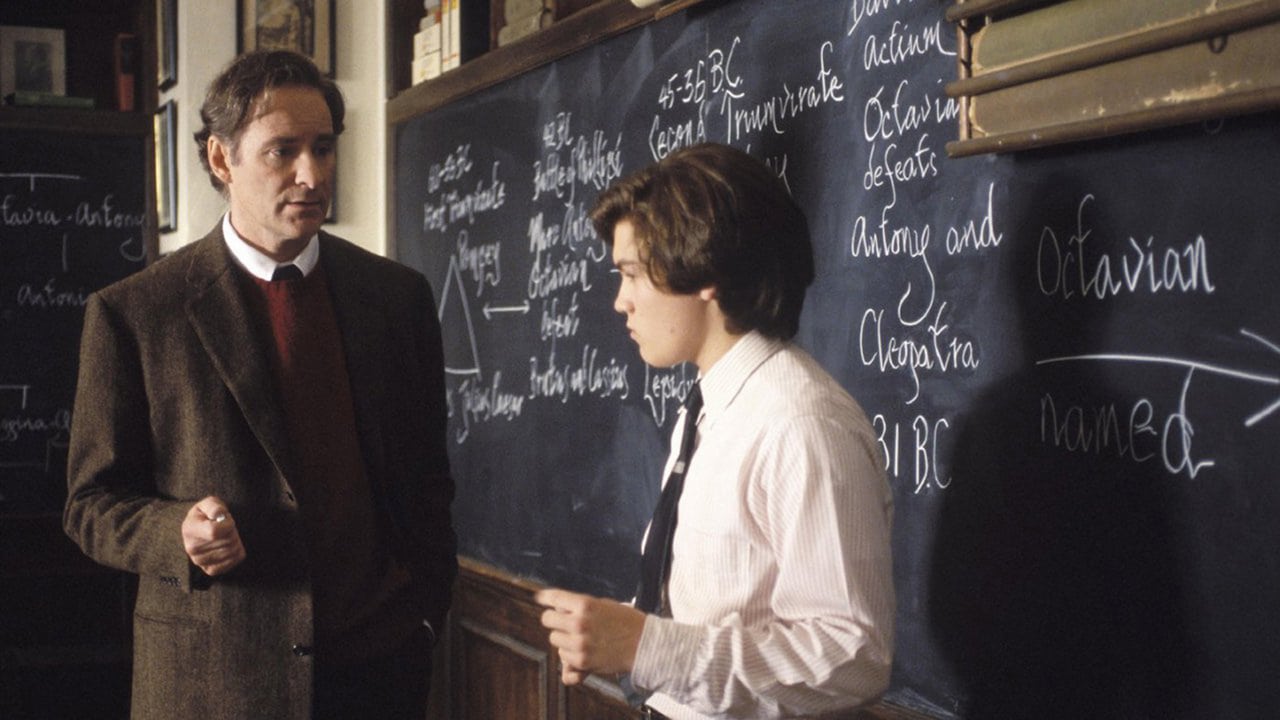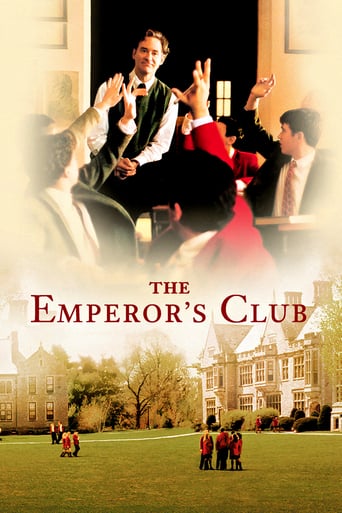

There many ways to classify films. One way is to divide them into films which will appeal to a broad audience (such as the Indiana Jones series), as opposed to "smaller" films which will appeal to a niche audience. This film is one of the latter. But as we so often see, it is often the niche films which garner little attention in which true greatness rests.This film is not about crashing cars or chases or murder or sex. It's about character.And make no mistake, Kevin Kline's measured performance here is about character, as well. I cannot imagine another actor who would have been so perfect in this role. Kline plays a sort of Mr. Chips at a prep school who inspires his students even while teaching about the Roman Empire, who realizes late in life that he has also failed a couple of his students and attempts to make amends...in one case successfully, in the other case not.Emile Hirsch is excellent in this film, albeit as a young man who become a cheat...and remains so in his adult life. And although the part is small, I rater liked the sensitive performance of Steven Culp, who also played one of Bree's husbands on "Desperate Housewives". In fact, it's difficult to fault any of the performances in this film. Superbly directed by Michael Hoffman.Perhaps this film connects with me because I was a teacher and school administrator. But this film gets a rare "8" from me.
... View MoreI've heard a lot of comparisons between "Dead Poets Society" and "The Emperor's Club". Both movies are worth seeing, but I wouldn't call the latter quite as good as the former. Still, I liked the depiction of the professor's drive to do what is best for his students, regardless of what his superiors say. In fact, it wasn't until I saw this movie that I'd ever heard of Hamilcar Barca.Kevin Kline certainly puts his best effort into the role of the mildly iconoclastic professor in the 1970s. Nonetheless, Michael Hoffman (who had previously directed Kline in "Soapdish" and "A Midsummer Night's Dream") should have had a little more to work with. I'll have to read "The Palace Thief" to see how the movie stacks up.Also starring Emile Hirsch, Embeth Davidtz, Rob Morrow, Edward Herrmann, Harris Yulin, Paul Dano and Jesse Eisenberg.
... View MoreThere cannot be any remake of the "Dead Poets Society". There cannot be any remake of "The Changing of the Guard" from the Twilight Zone. So why try? And this film is a remake of the two I have just quoted and maybe a few more. The only new element is to introduce in that elite Ivy League prep school a cheater as the main central student character. Nothing new really either, I mean cheating in those institutions is part of the job, part of the fun, part of the game and to be taken is not only a risk it is a pleasure. So, what can make this film worth making first and worth seeing second? Not much but one thing though. The fact that the teacher, the real main character, actually cheats to help a cheater access the competition he does not deserve accessing and the teacher discovers only after the competition that the chap was a cheater, which he did not know before. He confronts him in their mutual disappointment, mutual and reciprocal. But not disappointed entirely for the same reasons. The teacher because he cheated in the grading, hence he cheated another student who probably deserved the reward better than the recipient of the cheated grade. The cheater because he could not go through and lost anyway. But there is worse than that after all. The teacher realizes the student is cheating before the end of the competition and he tells the school's principal discretely and that one tells him to forget about it, to ignore it, which he does not do entirely, though he does it for everyone who is watching and is unaware of the cheating. He just changes the questions and looks for one that is not purely factual but that requires some wider knowledge and he fails the cheater like that. But the film is vicious somewhere because twenty-five years later or so, the same student, now grown up, married and the father of two sons, requires a repeat of the competition with a full class reunion in order to provide the school with a great grant to build a new library dedicated to his own dead father. But he wants the teacher to be there and preside on the ceremony. And it is a full repeat and we know from the very start it is going to be using modern technology of course. So, the interest is about the attitude of the teacher when he realizes he is being cheated, and how is he going to react in order to fail the cheater, and how is he going to confront him with the truth? That you will have to find out by yourselves. The punishment will be harsh on the teacher who will have to come to terms with his conscience about cheating on the grading, cheating one student in favor of another one, come to terms and make amends. The punishment will be even harsher for the cheater who will be confronted to no public scandal, he who wants to be a senator, but to a private and lasting knowledge that will run in his family for generations and will always classify him as a cheater, and no matter what he may say and think, that stain is hard to remove and to forget. But the subsequent real ending is sentimental and has little interest. In fact it is a double ending which makes it even more sentimental. The question that floats on top of all that is why? Why did the teacher not give the proper grade to that student who was going to reveal himself as being a cheater? Is it because that student was rowdy and difficult, because he had insinuated that he, the teacher, liked little boys, or because his father had told the teacher that he had to do his job, i.e. teaching, and not meddle with molding the child? Probably a little of the three: to prove he could bring the child on the right track, to prove to himself he was not hurt by the sexual insinuation and to prove to himself he could mold the child even without the agreement of his senator of a father. And he failed them all: the child was a cheater and not a success, he did not prove anything to anyone about his sexuality that remained unsatisfactory and totally clandestine, no matter what it may have been, and he did not mold the student since that student would do it again twenty five years later in front of his own wife and children. A complete failure. Maybe not quite a complete failure thanks to the two sentimental endings, but that is pure compensation, no real success. For the details get the film and watch it. You cannot foresee the second and last ending at all.Dr Jacques COULARDEAU, University Paris Dauphine, University Paris 1 Pantheon Sorbonne & University Versailles Saint Quentin en Yvelines
... View MoreThis movie is not one of the better titles that Kevin Kline has been a part of during his illustrious career. Kevin Kline has consistently shown his audience his deftness and his uncanny ability to get inside of a character and make it his own. The Emperor's Club is an okay movie that Kevin Kline keeps from going down the drain. One of the key factors in rating a movie or a performance to me is, what happens when the main character is off camera? Does the movie still move along? Am I eager to see the character again? Watch this movie with that in mind. Watch a fish called Wanda the same way. Or watch Wild Wild West. Kevin Kline simply shines through in every possible way.
... View More